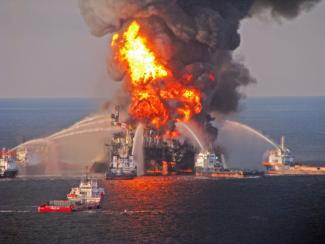Law
Fishermen versus oil giant

Along the US coast that was affected by the oil spill, millions have been spent on compensations and an extensive clean-up. But ecosystems do not stop at national borders. Ocean currents carried the pollution to other areas, notably Mexico, where the impacts have not been investigated properly.
In the years after the disaster, which according to one scientific study spilled up to 2 million barrels of oil (around 320 million litres) into the ocean, Mexican fishermen noted a dramatic decline in marine stocks. Some species have not recovered so far. Shrimp, crabs and food fish – which form the economic backbone of the region – are affected. The Mexican states that have sustained the biggest losses are Campeche, Tabasco, Tamaulipas and Veracruz. However, Mexico’s national media do not pay much attention to this issue.
The government of then President Felipe Calderón ignored scientists’ reports of signs of environmental damage. Nor was appropriate legal action taken. It may have played a role that other deep-water oil fields had recently been discovered and the government wanted multinational corporations to bid for drilling rights in an auction. Previously, only PEMEX, the state-owned petroleum company, had exploited Mexican oil resources.
In view of the national government’s initial lack of action, the state governments of Tamaulipas, Veracruz and Quintana Roo sued BP in a US court for the losses sustained. However, the case was dismissed in 2015 on the grounds that the areas affected were the responsibility of the Mexican government. The latter, for its part, had filed a law suit in 2013, and that case is still ongoing. In the meantime, the fishermen have also organised and taken BP to court. The key question is whether they can prove that the losses they suffered are a result of oil spill the multinational caused.
In this context, the work of Mexican scientists will be relevant. The fishermen’s case is based on their findings. One of us is an oceanographer at the National Autonomous University of Mexico (UNAM) and heads a research group that has investigated the impacts of two major oil catastrophes in the Gulf of Mexico. The first was an accident at the Ixtoc exploratory oil well drilled by PEMEX in 1979, and its impacts are still evident in the region’s ecosystems and beyond. The second was the BP Deepwater Horizon rig disaster in 2010.
Initial research was done in the summer of 2010, three months after the oil leak started, when the slick had not yet reached the Mexican coast. More surveys were done in the winters of the following two years. In winter, the ocean currents run south, so pollution is likely to be carried from the north to greater depths or even reaching the coasts. In the winter of 2012, the microorganisms that live in ocean sediment were assessed. Marked changes in terms of hydrocarbon presence were evident, and they could be connected with oil pollution.
Despite the scientific findings, BP denies that the changes observed on the Mexican coast are due to the Deepwater Horizon oil spill. If Mexican authorities spent more money on research in coastal regions, it would be easier to clarify matters. The lack of support stands in stark contrast to the massive resources that BP is mobilising for its legal defence.
In Mexico, critical voices now loudly demand to stop focusing exclusively on oil production to safeguard energy supply. For environmental reasons, they want renewables to get a greater share in the country’s energy mix. Production methods have hardly improved since the oil spill seven years ago, so ecosystems are still under constant threat.
Nearly five years after the Deepwater Horizon accident, an explosion occurred on a PEMEX drilling rig in the Sonda de Campeche. Four people died, several more were injured. Even though there was no oil leakage, the incident showed that there is a permanent risk.
In December 2016, the winning bids were announced in the auction for deep-sea drilling rights in Mexican waters. Two oil fields were awarded to a consortium comprised of Norway’s Statoil, French-based Total and BP – even though the company has still accepted no responsibility for the damage done along Mexico’s coasts.
Virginia Mercado is a researcher at the Universidad Autónoma del Estado de México (UNAM) and teaches peace and development studies.
Luis A. Soto is an oceanographer at UNAM’s Instituto de Ciencias del Mar y Limnología.








